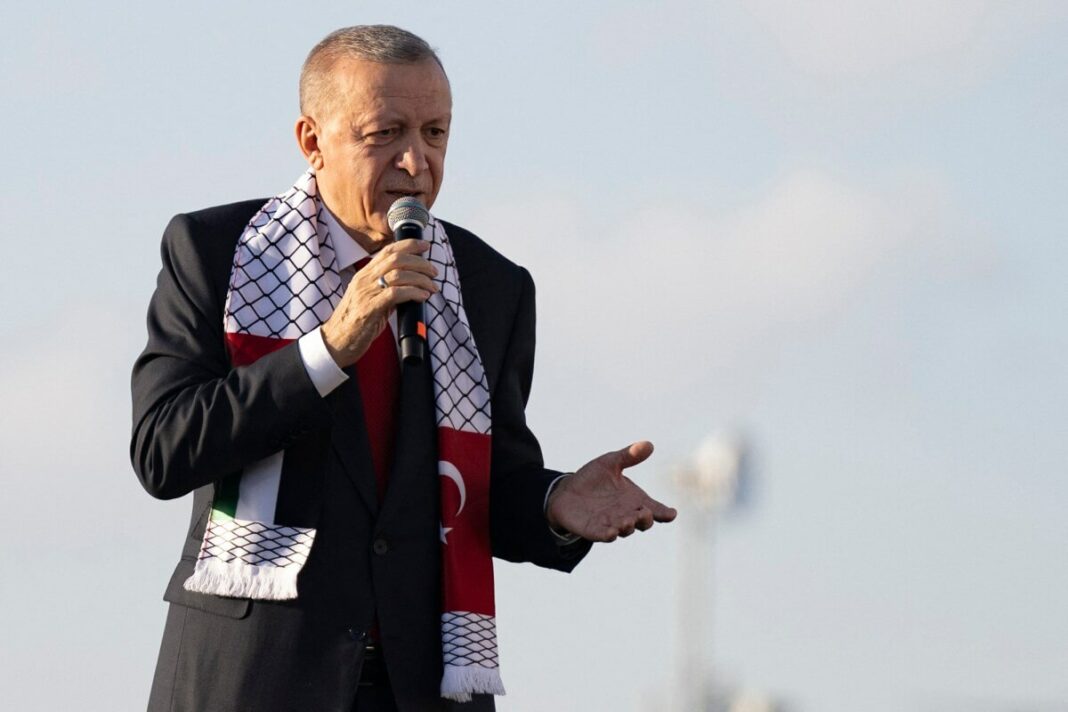As Turkey’s relations with the European Union come under strain over its democratic standards, President Recep Tayyip Erdoğan’s outspoken pro-Palestinian stance on the war between Israel and Hamas is further testing ties.
After a bloody October 7 raid by Hamas fighters triggered Israel’s relentless bombardment of Gaza, Erdoğan initially sought to position Turkey as a mediator.
But this apparent ambition evaporated last month after the Turkish leader portrayed Hamas not as a terrorist group but as “liberators” or “mujahideen” fighting for their land.
Turkey is technically a candidate for eventual EU membership and, even if this seems a distant prospect, Brussels would prefer Ankara to support rather than compete with its positions.
“What the president says reflects badly here in Brussels. We always expect Turkey to align with us in foreign policy,” said an EU official who wished to remain anonymous.
Erdoğan, a fervent advocate of Palestinian rights, toughened his criticism as civilian deaths in Gaza mounted, accusing Israel of committing war crimes and recalling Turkey’s ambassador to Tel Aviv.
He led a rally in İstanbul organized by his ruling party only a day before the celebrations marking the centenary of the Turkish republic on October 29.
“In its report on candidate countries’ progress towards meeting the criteria for joining the EU, published on Wednesday, the EU said Turkey’s unilateral foreign policy remained at odds with the bloc’s priorities.”
‘More and more difficult’
It said Ankara maintained a very low alignment rate of 10 percent with the EU stance on foreign and security policy compared with 8 percent in 2022.
“Its rhetoric in support of terrorist group Hamas following its attacks against Israel … is in complete disagreement with the EU approach,” it added.
Analysts fear that Erdoğan’s position on Israel and Gaza might upend his diplomatic outreach to the West after re-election victory in May.
“Erdoğan’s stance on Israel-Gaza adds to growing tensions between Turkey and the West over longer-standing issues, including EU accession,” said Hamish Kinnear, senior Middle East and North Africa analyst at risk intelligence company Verisk Maplecroft.
Turkish-EU relations have been at standstill since the launch of membership talks in 2005.
EU officials say the original enthusiasm evaporated and there has been a noticeable divergence from Western values, coupled with lack of political commitment to implement reforms.
The Gaza war exacerbates an already difficult relationship.
“When the war in Gaza started, many of us thought Turkey could be an honest broker and a big player in diffusing tensions in the region,” said another EU official.
‘Wrong place in history’
“We were very encouraged when we saw the significant role Turkey played in resuming [Ukrainian] grain exports via the Black Sea,” the official added, referring to Ankara’s role in trying to manage Russia’s efforts to block Ukrainian shipping.
Erdoğan’s rhetoric over Gaza put paid to these hopes.
“Europe needs to get engaged with Turkey but it’s getting more and more difficult,” one of the European officials said.
The European Parliament’s leading MEP on relations with Turkey, Nacho Sanchez Amor, said Erdoğan’s pro-Hamas stance did not go unnoticed.
“If you depict Hamas as freedom fighters, others will see the PKK as freedom fighters and then there’ll be problem,” he said, alluding to the outlawed Kurdistan Workers’ Party, which is listed as a terror group by Turkey and its Western allies.
Turkey’s foreign ministry responded to the EU report in a statement late on Wednesday, saying: “We consider as a form of praise the assessment in the text that criticizes our country’s stance on the Hamas-Israel war as entirely incompatible with the EU.”
“We feel the need to remind the EU, which is in the wrong place in history, that policies based on universal values, international law and humanitarian principles should be applicable not only to Ukraine or another region of Europe but also to the entire world, including the Middle East,” it added.
Erdoğan’s salvos at Israel are nothing new, but foreign policy expert Serkan Demirtas said that the Gaza war today “shows that the differences in geopolitical interests between both sides are gradually deepening.”
© Agence France-Presse


